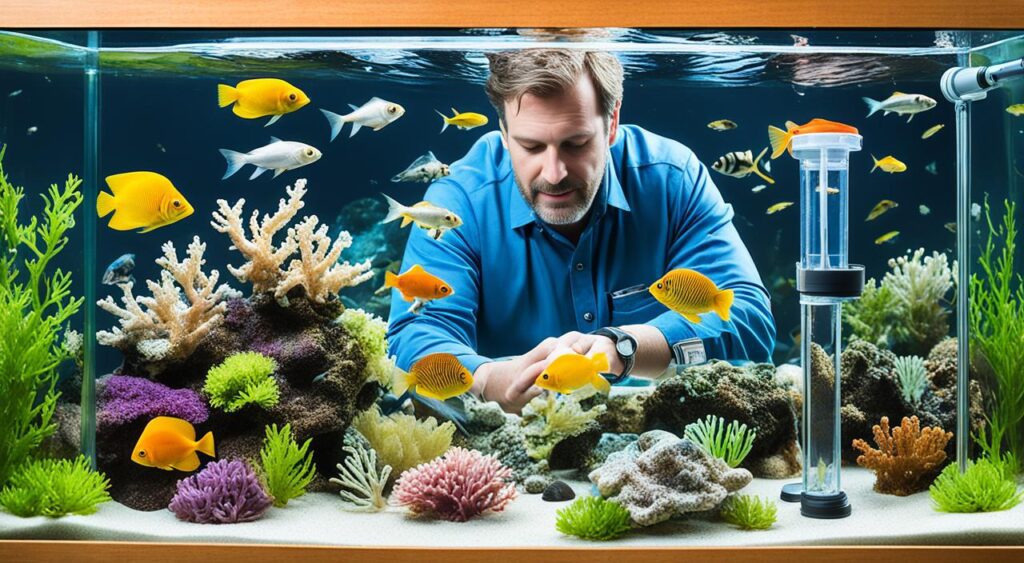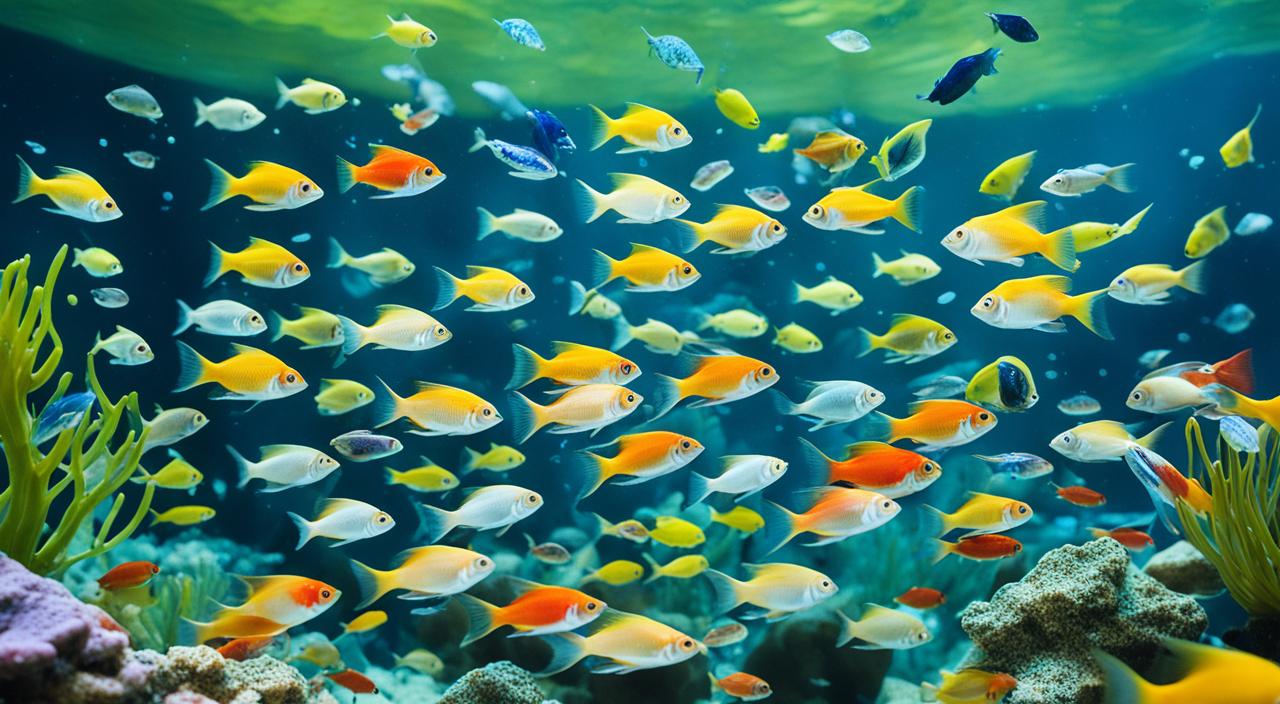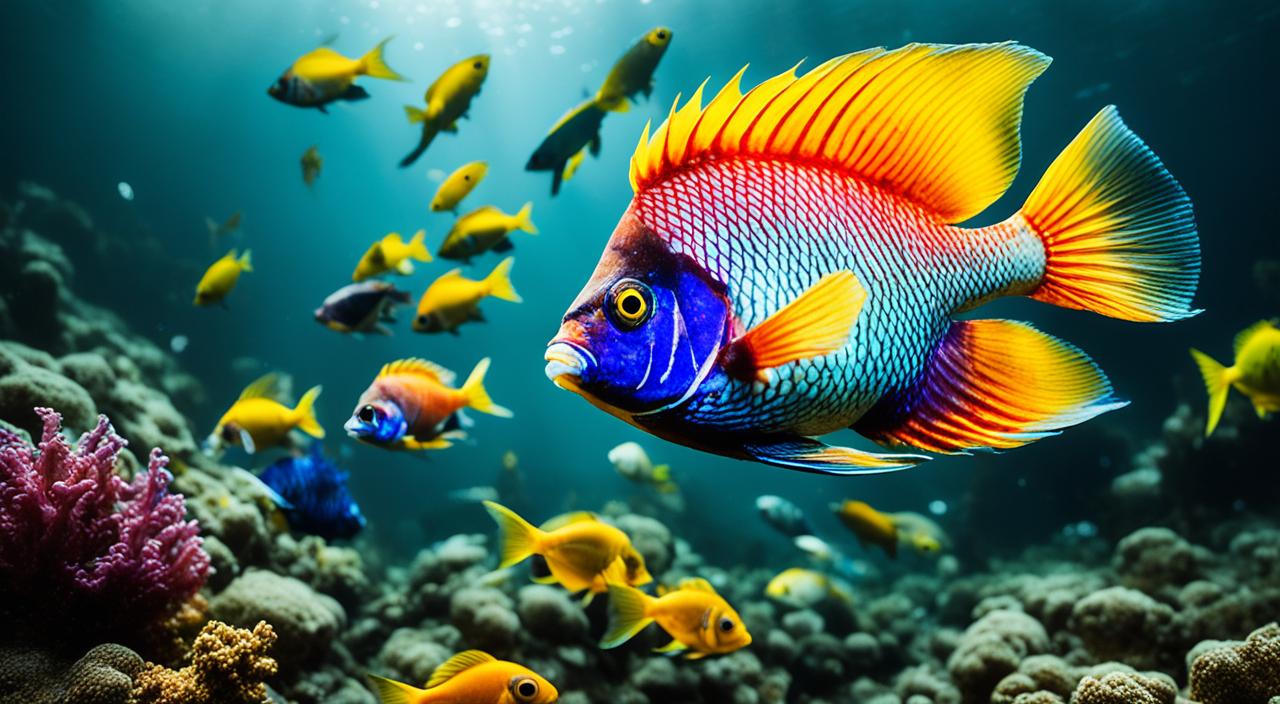Parasites are common in fishkeeping. These organisms live on or in fish and obtain their nourishment from them. While parasites can cause concern, it is crucial to understand that not all parasites harm fish or humans.
In this comprehensive guide, we will explore the world of fish parasites, their impact on ecosystems, common parasitic threats in aquariums, how to spot the signs of parasites in your fish, preventive measures for fish disease prevention, treatment protocols for infected aquariums, advanced parasite management tactics, and the role of environmental stress in parasitic outbreaks.
By the end of this guide, you will better understand parasites in fish and how to keep your fish healthy and parasite-free.
Key Takeaways:
- Parasites in fish are common but not always harmful.
- Understanding parasites is crucial for maintaining a healthy aquarium.
- Spotting the signs of parasites early enables timely treatment.
- Preventive measures like quarantine and good water quality are essential for fish disease prevention.
- Advanced tactics and stress reduction strategies can enhance parasite control in aquariums.
Understanding Parasitism in Marine Life
Parasitism is a common phenomenon in the natural world, and marine life is no exception. This section will explore the intricate relationship between parasites and their hosts in the marine environment.
Defining Parasites
Parasites live on or within other organisms, known as hosts, and rely on them for nourishment. They can belong to various taxonomic groups, including viruses, bacteria, protozoa, fungi, and metazoans. These parasites have evolved different strategies to exploit their hosts, often resulting in a complex and dynamic interaction.
The Relationship between Host and Parasite
The relationship between hosts and parasites can vary from symbiotic to pathogenic. Some parasites establish a mutually beneficial relationship with their hosts, known as mutualistic symbiosis, where both entities gain certain advantages. Other parasites are parasitic, deriving benefits at the expense of their hosts.
This relationship can range from mild parasitism, where the host experiences minimal harm, to severe parasitism, where the host may suffer significant damage or even death. The co-evolution between hosts and parasites has shaped their interactions over millions of years, leading to intricate adaptations.
Impact of Parasites on Ecosystems
Parasites play a crucial role in maintaining the delicate balance of ecosystems. They can influence their hosts’ population dynamics, shaping species’ abundance and distribution. By regulating host populations, parasites contribute to the stability and biodiversity of ecosystems.
Moreover, parasites can act as indicators of environmental health, as their presence and abundance reflect the overall condition of aquatic habitats. Changes in parasite communities can alert scientists and environmental managers to potential environmental disturbances or emerging diseases.
Common Parasitic Threats in Aquariums
Aquariums provide a controlled environment for fish but are not immune to parasitic threats. This section will explore some of the most common parasites affecting fish in aquariums and discuss how to combat them effectively.
Identifying Protozoa
One of the common fish parasites found in aquariums is protozoa. These single-celled organisms can cause various diseases in fish. Identifying protozoa can be challenging since they are microscopic and often go unnoticed until fish exhibit symptoms such as loss of appetite, erratic swimming, or abnormal growth. A microscope is necessary to identify protozoa and examine skin scrapings or gill samples. Consulting a fish health professional for accurate identification and appropriate treatment is essential.
Combatting Larval Roundworms
Larval roundworms are another common parasitic threat in aquariums. These tiny worms can infect fish through contaminated live or frozen food. Symptoms of larval roundworm infestation include weight loss, bloating, and reduced activity. Regular cleaning and disinfection of aquarium equipment are essential to combat larval roundworms. Additionally, feeding fish a balanced diet and avoiding introducing infected fish or live foods can help prevent infestations. In severe cases, specific medications may be necessary to eradicate the parasites.
Flukes and Roundworms: A Dual Challenge
Flukes and roundworms pose a dual challenge to fish health in aquariums. Flukes, or flatworms, are parasitic worms that can attach to fish’s skin, gills, or internal organs. Roundworms, on the other hand, reside in the digestive system and can cause damage to the gastrointestinal tract. The simultaneous presence of flukes and roundworms can lead to severe health issues for fish. Treating these parasites often requires a multifaceted approach, including medication, proper tank hygiene, and isolating infected fish to prevent further spread.
Aquarium hobbyists can take proactive measures to combat these threats and keep their fish healthy and parasite-free by understanding common fish parasites such as protozoa, larval roundworms, flukes, and roundworms. Regular observation, proper hygiene, and prompt treatment can go a long way towards maintaining a thriving and disease-free underwater ecosystem.
Spotting the Signs of Parasites in Your Fish
Early detection of parasitic infections is crucial for effective treatment. By being vigilant and observant, you can ensure the health and well-being of your fish. In this section, we will discuss how to spot the signs of parasites in your fish and the importance of regular observation.
Detecting Visual Indicators
Visual indicators can help identify the presence of parasites in your fish. Pay close attention to any abnormalities in the fish’s appearance. Look for changes in colour, such as spots, lesions, or discolouration. Look for visible parasites, such as lice, worms, or flukes. These visual cues can provide valuable insights into the health of your fish and signal a possible parasitic infection.
Behavioural Changes Due to Parasitic Infection
Parasitic infections can also manifest in behavioural changes in fish. Watch for unusual behaviour, such as excessive scratching or rubbing against objects in the aquarium. Notice any changes in swimming patterns, such as lethargy or difficulty swimming. Pay attention to changes in feeding behaviour, appetite loss, or excessive feeding. These behavioural changes can indicate a parasitic infection and should not be ignored.
The Importance of Regular Observation
Regular observation of your fish’s health is essential to catching any signs of parasites early on. Make it a habit to inspect your fish regularly for any visual indicators mentioned earlier. Note any unusual behaviours and compare them to your fish’s usual behaviour. By establishing a baseline of their normal appearance and behaviour, you can quickly identify deviations from a parasitic infection. Regular observation empowers you to take timely action and seek appropriate treatment.
Spotting the signs of parasites in your fish requires keen observation and attention to detail. By proactively monitoring your fish’s health, you can catch parasitic infections early and take the necessary steps to treat and protect your fish.
Keeping Fish Introduction to Parasites
Keeping fish can be a rewarding hobby, but it also comes with specific challenges, such as parasites. In this section, we will introduce parasites in the context of keeping fish. We will explore the basics of fish parasites and their impact on fish health. By understanding the fundamentals, you will be better prepared to tackle parasitic threats in your aquarium.

Preventive Measures and Fish Disease Prevention
Prevention is key when it comes to ensuring the health and well-being of your fish. By implementing proper preventive measures, you can safeguard your fish from parasitic infections and promote a thriving aquarium environment. This section will discuss three essential aspects of fish disease prevention: quarantine procedures for new additions, aquarium maintenance and water quality, and dietary strategies for immune support.
Quarantine Procedures for New Additions
When introducing new fish to your aquarium, following a strict quarantine procedure is crucial. Quarantine tanks provide a controlled environment where you can observe and evaluate the health of new fish before introducing them to the main aquarium. This helps prevent the spread of parasites and diseases to your fish population.
During the quarantine period, closely monitor the new fish for any signs of parasites or illness. Please treat them with appropriate medications to eliminate any potential threats. It’s essential to keep the quarantine tank clean and maintain optimal water quality to ensure the well-being of the new fish.
Aquarium Maintenance and Water Quality
Maintaining good water quality is crucial in preventing fish diseases and parasite outbreaks in your aquarium. Regular cleaning and maintenance should include water changes, filter cleaning, and gravel vacuuming. These activities help remove excess waste, debris, and harmful substances from the aquarium.
Test the water regularly to ensure proper pH, ammonia, nitrate, and nitrite levels. Make adjustments as necessary to maintain a healthy aquatic environment. Poor water quality can weaken your fish’s immune system, making them more susceptible to parasites and diseases.
Additionally, consider using a high-quality filtration system and adding beneficial bacteria supplements to promote a stable and balanced ecosystem in your aquarium.
Dietary Strategies for Immune Support
A well-balanced and nutritious diet is essential for supporting your fish’s immune system. Proper nutrition can enhance their ability to resist parasitic infections and stay healthy. Include a variety of high-quality commercial fish foods in their diet to ensure they receive all the necessary vitamins, minerals, and nutrients.
Consider incorporating foods rich in immune-boosting ingredients, such as garlic, spirulina, and beta-glucans. These ingredients have been known to strengthen fish’s immune response and reduce the likelihood of parasitic outbreaks.
Remember to feed your fish appropriate portion sizes and avoid overfeeding, as excessive leftover food can lead to poor water quality and nutrient imbalance.
Treatment Protocols for Infected Aquariums
Despite preventive measures, parasitic infections can still occur in aquariums. When faced with an infected aquarium, it’s crucial to have a plan to effectively treat the parasites and restore the health of your fish. In this section, we will explore various treatment protocols that you can implement.
Aquarium Parasite Treatment Options
Several options are available for treating fish parasites in aquariums. These include medications specifically designed to target parasites and natural remedies that can help eliminate the infestation. The choice of treatment will depend on the type of parasite and the severity of the infection. It’s important to carefully follow the instructions provided with the chosen treatment option to ensure its effectiveness and the safety of your fish.
Step-by-Step Guide to Treating Common Fish Parasites
To effectively treat common fish parasites, following a step-by-step guide is essential. This guide will provide you with a clear understanding of the process and help you navigate the treatment confidently. It typically involves isolating infected fish, removing them from the main aquarium, and administering the appropriate treatment. Additionally, regular monitoring and observation are crucial to tracking the progress of the treatment and making any necessary adjustments along the way.

When to Seek Professional Help
In some cases, fish parasite infections may be particularly severe or treatment-resistant. When this happens, it’s essential to seek professional help from a veterinarian or aquatic specialist. These experts have the knowledge and experience to diagnose the parasite and recommend the most effective treatment options. Additionally, they can guide you in preventing future parasitic outbreaks and maintaining the overall health of your aquarium.
Advanced Parasite Management Tactics
Implementing advanced parasite management tactics in your aquarium may be necessary to effectively control parasites. These strategies go beyond basic preventive measures and can help ensure the health and well-being of your fish. In this section, we will explore some advanced tactics for fish parasite control and their importance in maintaining a parasite-free environment.
One advanced tactic for parasite management is the use of UV sterilizers. UV sterilizers utilize ultraviolet light to kill or deactivate parasites, bacteria, and other harmful organisms in the water. Installing a UV sterilizer in your aquarium’s filtration system can reduce the risk of parasitic infections and create a healthier environment for your fish.
Another critical aspect of advanced parasite management is specialized filtration systems. These filtration systems are designed to effectively remove parasites and their eggs from the water, reducing the overall parasite load in the tank. Examples of specialized filtration systems include diatom filters and fluidized bed filters. You can significantly improve parasite control by incorporating these systems into your aquarium.
Proper aquarium husbandry is also a crucial aspect of advanced parasite management. Maintaining good water quality, regular water changes and correct nutrition can boost your fish’s overall health and immune system, reducing their susceptibility to parasitic infections. Providing optimal living conditions for your fish creates a less favourable environment for parasites to thrive.
Additionally, fish population management plays a key role in advanced parasite management. Overcrowding can lead to increased stress levels in fish, which in turn weaken their immune systems and make them more susceptible to parasites. By carefully managing the number and species of fish in your aquarium, you can reduce the risk of parasitic outbreaks and maintain a healthier fish population.
By implementing these advanced parasite management tactics, you can enhance your ability to control parasites in your aquarium and ensure the well-being of your fish. Remember always to prioritize the health and happiness of your aquatic pets, and they will reward you with their vibrant colours and active behaviour.
The Role of Environmental Stress in Parasitic Outbreaks
Environmental factors can significantly impact the occurrence and severity of parasitic infections in fish. When fish are exposed to stressful conditions in their habitat, their immune system weakens, making them more vulnerable to parasitic attacks. This section will explore the relationship between environmental stress and parasitic outbreaks, helping you understand how to mitigate these risks for your fish.
Symptoms of Stress-Induced Parasitism
Stress-induced parasitism in fish can manifest in various ways. Some common symptoms include changes in behaviour, such as increased aggression, reduced appetite, or lethargy. Physical indicators may consist of skin discolouration, fin clamping, excessive mucus production, or the appearance of lesions and ulcers. Monitoring your fish closely for signs of stress-induced parasitic infections is crucial, as early detection can significantly increase the chances of successful treatment.
Strategies for Stress Reduction in Aquatic Habitats
Reducing environmental stressors can help create a healthier and less susceptible environment for your fish. One vital strategy is maintaining optimal water quality by regularly testing and adjusting parameters like temperature, pH, and ammonia levels. Additionally, providing appropriate hiding places and territorial boundaries can help reduce aggression among fish. Ensuring a proper diet and feeding regimen tailored to your fish’s needs can bolster their immune system and combat stress-induced parasitism.
Furthermore, creating a calm and stable aquatic habitat is essential by minimizing sudden changes in temperature or water chemistry. Avoid overcrowding the tank, as this can lead to increased competition for resources and heightened stress levels among fish. Finally, maintaining a consistent and appropriate lighting schedule can help establish a natural day-night rhythm, promoting a sense of security for your fish.
By implementing these stress reduction strategies and actively monitoring your fish for any signs of stress-induced parasitic infections, you can enhance their overall well-being and minimize the risk of parasitic outbreaks in your aquarium.


